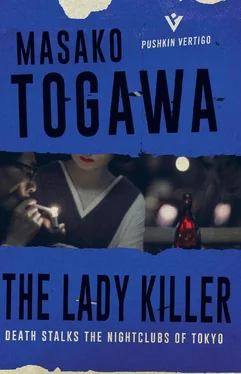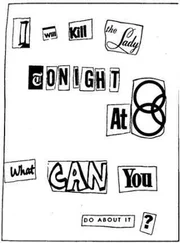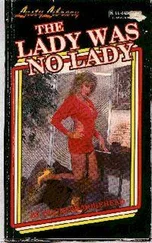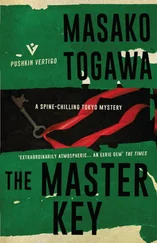“But there’s a page missing at the very front—look, can you see where it has been torn out?” It was true.
“Who did he say his first victim was? Surely it was… Yes, it’s the woman who appears as number two in this book. But there was obviously somebody before her—who could it have been? And why is the page missing?”
The old man closed his heavy eyelids and began to think. Eventually he spoke, half to himself.
“If we are not careful, we are in danger of making a big mistake.”
He spoke with pain; had he suddenly realized some mistake that he had already made in his theorizing? Shinji tried to engage him in conversation as the car rolled through the town, but to no avail. When the car stopped at a red light at Hibiya, the old man broke his silence; leaning forward, he said to the driver, “Sugamo Prison, please.”
On the way to the jail, Shinji’s mind was in a turmoil. He longed to read the Huntsman’s Log, which was reposing on the old man’s knee, and yet he half dreaded the thought. What had Honda written about his affair with Michiko Ono? How fully did he describe his lovemaking? In what tones had Michiko spoken to him? He realized that he was jealous.
For him, curiosity about his old lover meant as much as the torn-out page in the diary meant to the old man.
2
The waiting room at the prison was hot and stuffy; Shinji’s face ran with sweat. The old man sat steady as a rock, his black bag, containing the diary, on his knee. At last their turn came, and they went into the interview room.
The condemned man naturally wore no necktie, and this added to his appearance of shabbiness and depression. Just as the old man had said, he looked as if all the fight was gone from him. He was in need of a shave, and his hair was dry and disheveled. And above all, the light was gone from his eyes.
Was this the man who had held Michiko Ono close to his breast? Shinji realized that he was glaring at Honda and quickly adjusted his countenance to one of total unconcern—unconcern toward Honda, toward the stone walls and the flagged floor.
“We have found the diary,” said the old man. Behind the wire netting, Ichiro Honda was momentarily speechless.
“Where?” he said at last, his lips twitching. His deep voice was somber.
“At the Midori-so, where Mitsuko Kosugi was murdered. Obana’s sister had an apartment on the second floor of the same building. We had advertised for her, and the manager of the apartment came to see us today. She moved in there in September, but hasn’t been near the place for the last two months.”
“I see,” said Honda, hanging his head low, his hands joined loosely between his knees. “Now I understand. When I went there, I noticed the name ‘Obana’ on a shoe box at the entrance, but I didn’t associate it with the key-punch operator.”
“If the criminal who entrapped you had a room there, your whole explanation becomes rational. No wonder your shoes disappeared; not surprising that the door was locked on you. Maybe she was hiding in the broom cupboard opposite the door.”
“But then why did the key turn up in my pocket?”
“You now say that you may have unconsciously removed the key when you stepped into the room, and put it into your pocket. But that isn’t what happened at all. I think the criminal put it into your pocket when the jacket was hanging in your apartment in Yotsuya. The woman with the mole had access to that room; we know that, because she stole the diary. Reading it, she could predict your activities and play her tricks upon you.”
“But how come the blood was my type?”
“She got the names of donors of your type from blood banks and must have collected from one of them—we know she made contact with at least four. Shinji, the man next to me, interviewed them all.” Honda glanced at Shinji and then looked back at the old man.
“There’s a lot I still don’t fully understand. Why was there no sign of a struggle in any of the cases?”
“Perhaps the criminal used an anesthetic—chloroform or something like that. That would explain the sweet smell you noticed in both Fusako Aikawa’s room and also Mitsuko Kosugi’s.”
“Chloroform. That fits.”
“And the semen. That was collected from the blood donors, too.”
“It’s mad!” exclaimed Honda, tugging at his hair nervously. “Why me?” Watching him vacantly, Shinji realized that he had no more than a walk-on part in this drama.
The old man took out the notebook. “Your memory was very good. However, the criminal tore out the pages referring to Keiko Obana. That I can understand. What I cannot understand is why he tore out this page—the first one. Who was the woman described here?” The old man displayed the book to Honda. Looking at it, the prisoner’s eyes gradually became hollow. It was as if his whole core had suddenly melted, leaving him no more than a soft doll. Watching the scene, Shinji felt even more of an outsider. Ichiro Honda knew whose name had appeared in that missing page… and so did the old man. The closeness of the room began to irritate him.
Honda opened his mouth for a few seconds, like a landed fish that finds the density of the air too much. “I can’t remember who it was,” he said at last. “Please give me time to think about it.” From the way he would not meet their eyes, Shinji realized that Honda knew the name of the woman very well but was not saying. The old man knew, too, he was certain. But the old man was silent. Without a word, he stood up, and gazed at the prisoner with sympathy before leaving the room.
On the way back to the office, Shinji wondered what the old man was going to do with the diary. What was the old man thinking about, his head on his chest, a cigar in his mouth?
Shinji, for his part, felt the slow stain of jealousy creep toward his heart. All of that diary that he wished to read was the passage referring to Michiko Ono.
3
About a week passed, and then there was a sudden development that took Shinji by surprise. Honda asked for an interview with the director of the prison and confessed his guilt, asking to be allowed to withdraw his appeal.
“Just what I feared,” said the old man mysteriously. “We’re off on our travels—get ready at once.”
“Where are we going?”
“To Osaka. I’ve got to talk to the father-in-law of our client.”
They left Tokyo that evening, and on the next day Shinji waited at the hotel whilst the old man went off to see Ichiro Honda’s father-in-law. Before leaving, Hatanaka had been once more to Sugamo Prison, but Honda would say nothing about the missing page, merely asserting his guilt. Even Shinji understood that the reason for Honda’s new stance was based upon the missing page at the front of the diary.
The old man had been to Osaka already, on his own, for five days from the day after the two of them had interviewed Honda in prison. He was uncommunicative about his trip, and Shinji did not feel that he could question him about it, confining himself to grumbling to Mutsuko Fujitsubo about the old man hogging the case now that it was getting interesting. He did at least gather that the objective had been to visit Honda’s wealthy father-in-law as well as his wife. He had to admire the vigor of the old man, now over seventy, in undertaking this trip.
Now Shinji waited in the Osaka hotel. An hour passed, and the old man returned. Where had he been? Shinji did not ask, but got into the car and accompanied his chief to Ichiro Honda’s wife’s home.
They were met by the old housekeeper. She was plainly expecting them and conducted them immediately to the atelier at the back of the garden. Within, it was almost dark despite the brightness of the day outside; the only sound to be heard in the otherwise cavernous silence was the hum of the air conditioner. The old retainer took a long pole and slid back the cover to the skylight; immediately the room was flooded with light.
Читать дальше












